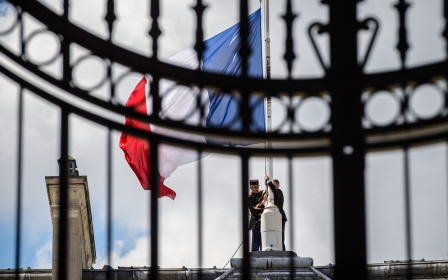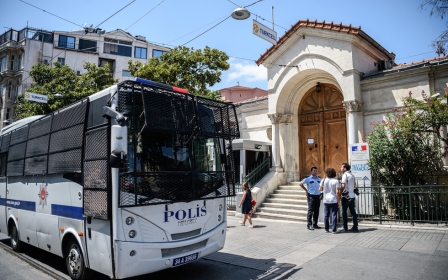Leading French media refuse to publish photos of church attackers

French authorities, press and religious figures have rushed to try and calm tensions following the brutal murder of an 86-year-old priest in Normandy.
A day after the attack, which was carried out by two teenagers and claimed by the Islamic State group, French President Francois Hollande gathered religious leaders at the Elysee Palace on Wednesday and vowed to preserve national unity.
Prime Minister Manuel Valls has warned that the goal of the attack was to "set the French people against each other, attack religion in order to start a war of religions”.
French daily, Le Monde, made a statement saying that it would not publish photos of the church attackers in a bit to avoid feeding the cult of the dead and encouraging further attacks.
“Following the Nice attack [where an IS-affiliated attacker ploughed a truck into a crowd of civilians and killed 84], we will publish no more photos of attackers to avoid possible posthumous glorification,” the paper wrote in its daily editorial.
It said that its policy on the issue would continue to evolve as long as the IS threat gripped the nation. Other media outlets have now also started hotly debating how to responsibly cover IS attacks and their perpetrators, with calls to not over-report on the lives of attackers growing and major broadcaster BFM-TV also announcing it would no longer print photos of attackers later in the day.
The Secretary of State responsible for Victim Support, Juliette Meadel, last week additionally announced that she will set up a working group on appropriate coverage which will issue its first proposals in September.
There have also been growing calls to review Islamic institutions in France, with Nadine Morano, a centre-right politician and former minister, on Tuesday evening calling for a review.
Her calls have since turned into a hashtag on social media #RevoirLorganisationDeLIslam that has begun trending in France, although many of the the reactions appear to be criticising the calls and saying that the majority should not be made to feel guilty for the actions of a few.
A leading Paris imam, Dalil Boubakeur, separately issued calls for religious reform.
“There is a misinterpretation of values,” Boubakeur, who heads up the Grand Mosque of Paris, told reporters on Wednesday.
“We have hope that in the future, there will come a time for Muslims to think about what is wrong in this world view of Islam and that French Muslims can start pushing for imams to be trained and pay more attention to the content [of this training] and therefore to create a drive for some kind of reform in our institutions on the agenda.”
In the short-term, however, religious leaders have been quick to call on the authorities to step up security at Christian, Jewish and Muslim places of worship.
“We deeply desire that our places of worship are the subject of greater (security) focus, a sustained focus," said Boubakeur, after the meeting with Hollande.
Pierre Amar, a priest from Versailles near Paris, also told media after the meeting that his community was “stunned because we did not know it was dangerous to be a priest these days in France."
Holland and his government are expected to come under fresh scrutiny after Wednesday’s attack, which is only the latest in a growing line of deadly Islamic State or al-Qaeda-linked killings. It has since emerges that one of the attackers,19-year-old Adel Kermiche, was awaiting trial on terror charges and had been fitted with an electronic tag, when he fled his home and travelled to Saint-Etienne-de-Rouvray where he took several hostages before slitting the priest’s throat.
The embattled president, who is not expected to secure re-election in next year’s presidential vote, has tried to stress that further restrictions on liberty may be counter-productive given that France has been under a state of emergency since November when IS militants launched a string of attacks in Paris, killing 130 people. The state of emergency gives government extensive powers to detain and question anyone suspected of crime or terrorism links.
Middle East Eye propose une couverture et une analyse indépendantes et incomparables du Moyen-Orient, de l’Afrique du Nord et d’autres régions du monde. Pour en savoir plus sur la reprise de ce contenu et les frais qui s’appliquent, veuillez remplir ce formulaire [en anglais]. Pour en savoir plus sur MEE, cliquez ici [en anglais].




